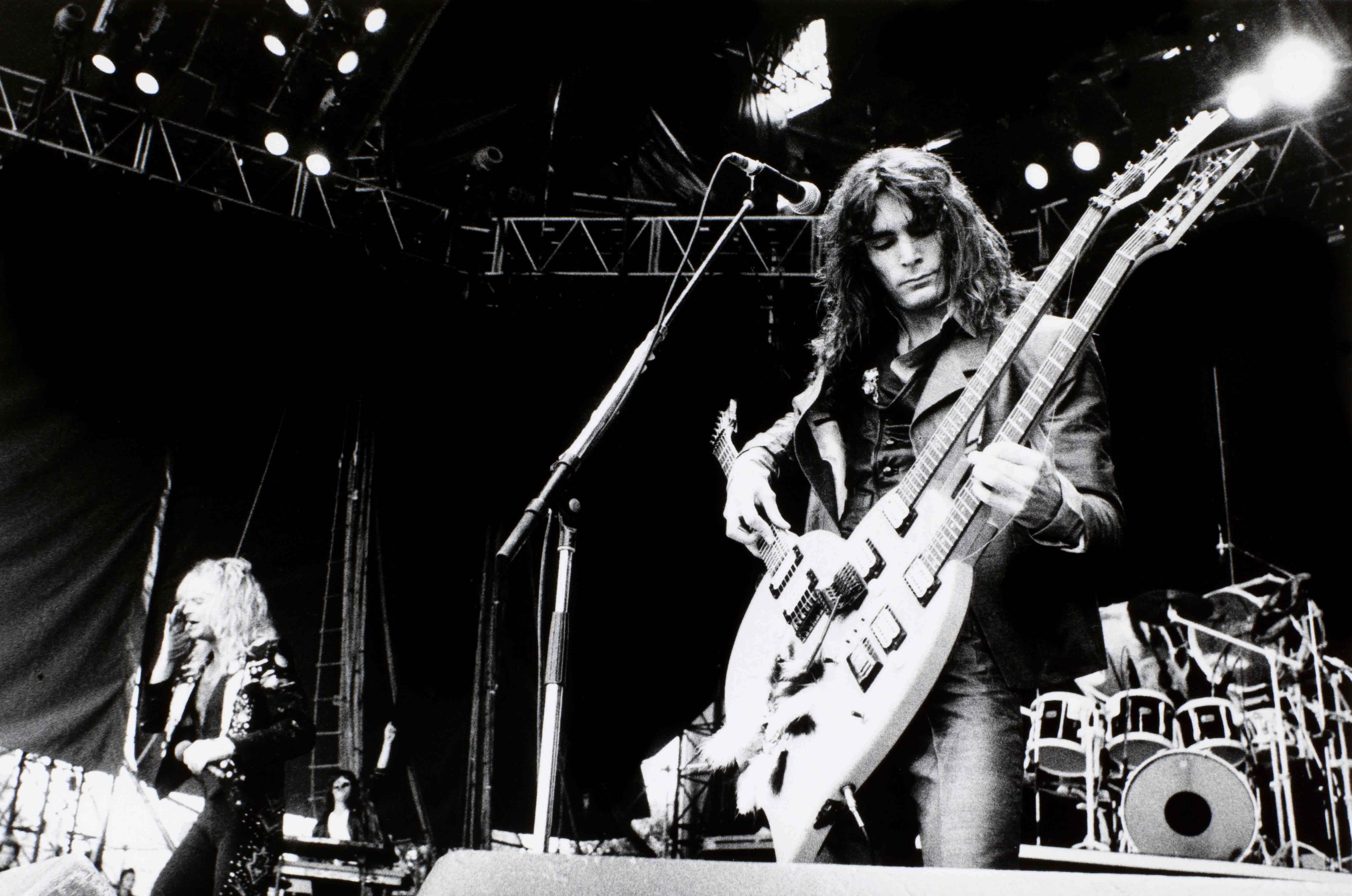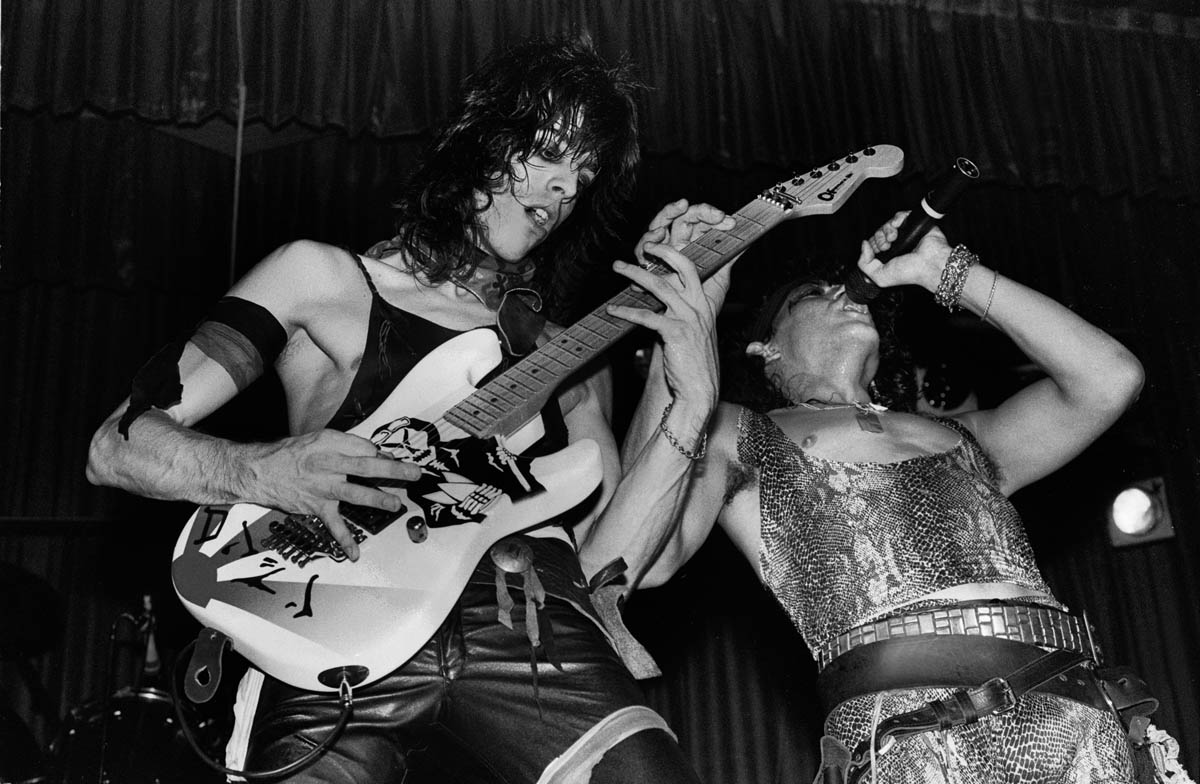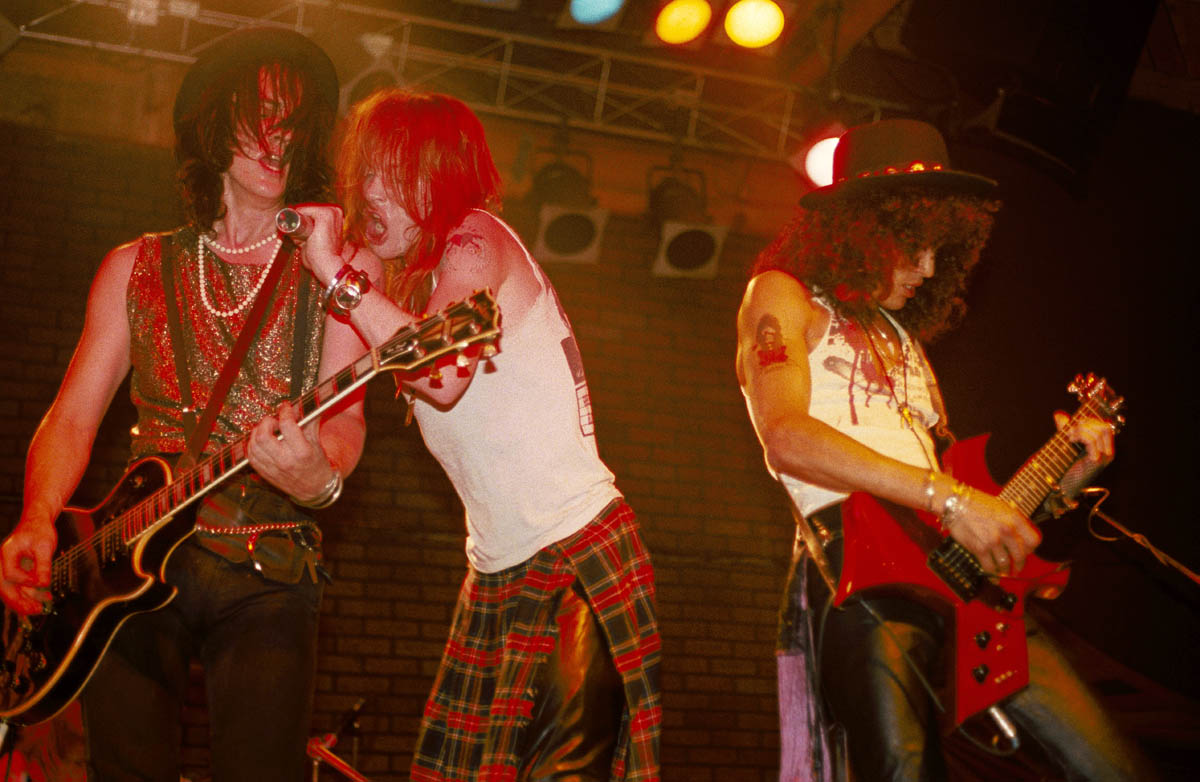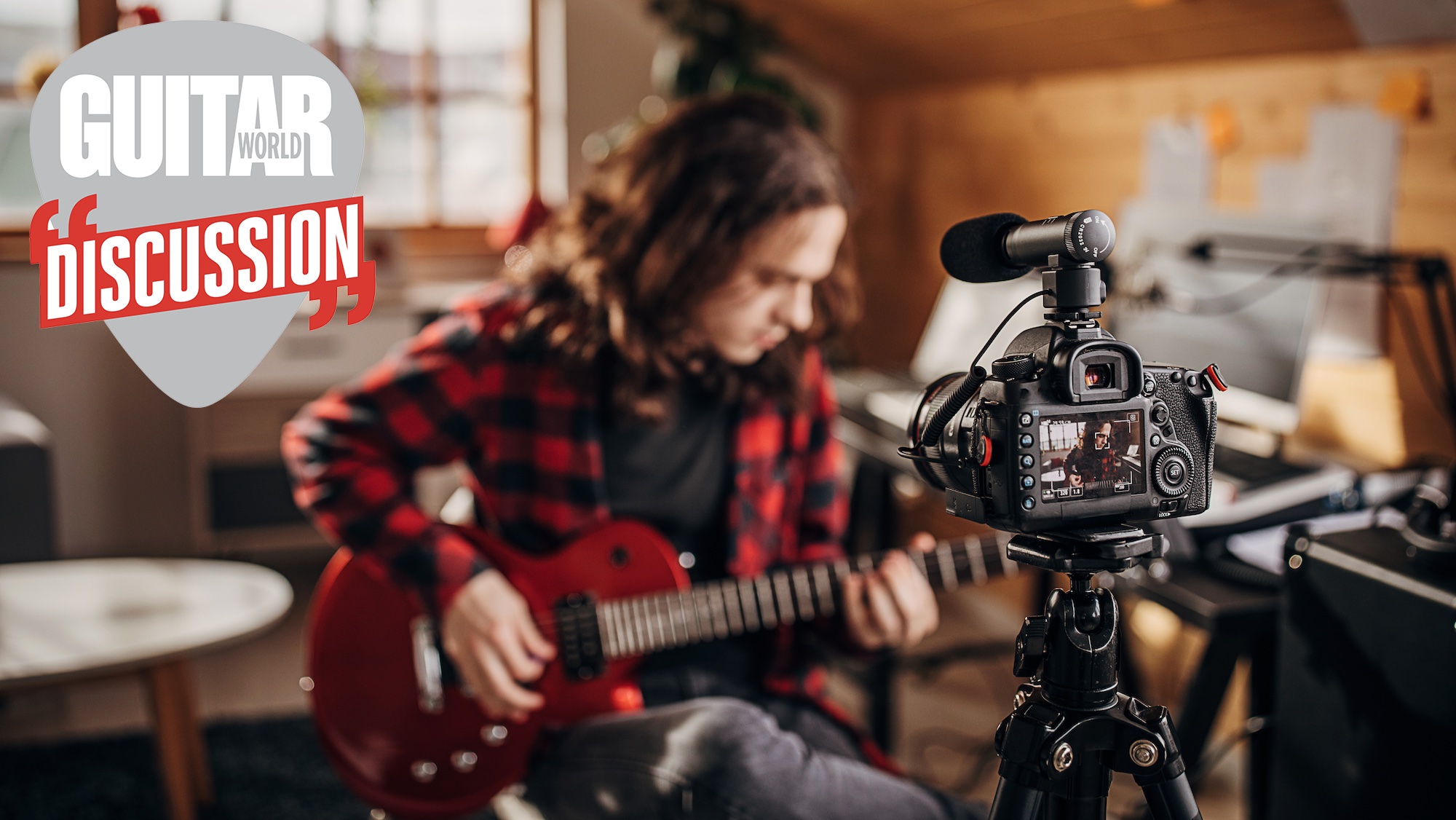Slash, Mick Mars, Steve Vai, Nuno Bettencourt and many more look back at the '80s hard-rock guitar scene
An exclusive extract from Nothin' But a Good Time, the new book from GW's Tom Beaujour and Richard Bienstock

All the latest guitar news, interviews, lessons, reviews, deals and more, direct to your inbox!
You are now subscribed
Your newsletter sign-up was successful
Hard rock in the 1980s was a hedonistic and often intensely creative wellspring of escapism that helped define a spectacularly over-the-top decade.
Indeed, fist-pumping hits like Twisted Sister’s We’re Not Gonna Take It, Mötley Crüe’s Girls, Girls, Girls and Guns N’ Roses’ Welcome to the Jungle are as inextricably linked to the era as Reaganomics, Pac-Man and E.T.
Nöthin’ But a Good Time, a new book from Guitar World writers and former editors Tom Beaujour and Richard Bienstock, captures the energy and excess of the hair metal years in vivid detail.
They weaved together more than 200 interviews with the musicians, managers, producers, engineers, label executives, publicists, stylists, costume designers, photographers, journalists, magazine publishers, video directors, club bookers, roadies, groupies and hangers-on who lived it in all of its outrageous glory.
But in an era characterized by big hair, brash stage wear and over-the-top production, it was the sheer talent of many of the era’s fleet-fingered rock guitar heroes that shone brightest.
From Steve Vai to Yngwie Malmsteen, Dokken’s George Lynch to Ratt’s Warren DeMartini, Extreme’s Nuno Bettencourt to White Lion’s Vito Bratta (who gave his only interview in more than two decades to the authors), the scene produced some of the greatest and most lastingly influential six-string practitioners in rock history.
In this excerpt from Nöthin’ But a Good Time, these artists, as well as a cast of other contemporaries and experts, look back on the era of killer riffs, pointy guitars and glorious, glorious shredding. Take it away, Steve…
All the latest guitar news, interviews, lessons, reviews, deals and more, direct to your inbox!
STEVE VAI (guitarist, David Lee Roth, Whitesnake; solo artist): “When the ’80s came along, the shift was more toward the rock star thing. Entertainment. But at the same time there was a desire to play the shit out of the instrument. We loved playing instruments.“
ZAKK WYLDE (guitarist, Ozzy Osbourne): “The ’80s were an amazing time for guitar.v
VITO BRATTA (guitarist, White Lion): “It was a really strange time period, because no matter what new band came out, everybody waited for the solo. 'Let me see who the guitar player is.' It was just one after another. Reb Beach. Nuno Bettencourt. This one. That one. Whoever.“
BRAD TOLINSKI (former editor-in-chief, Guitar World): “Eddie Van Halen was ground zero for the modern era. If you want to pull it backwards, it was like Elvis and the Beatles . . . Everyone knew that they were the kings, and everyone else just lived their life around that.
“Even amongst all the players, people like Reb Beach or Vito Bratta or Nuno Bettencourt, who might have actually had a better technical command of the instrument, they all acknowledged that it was really Eddie’s world, and everything revolved around that.“
NUNO BETTENCOURT (guitarist, Extreme): “The Bettencourt soup has a bit of a sprinkle of Eddie, it’s got some Al Di Meola, it’s got some Prince, it’s got some Brian May, it’s got Zeppelin. It’s my soup. It’s not anyone else’s. But you also wanna compete. You wanna go in there and take those guys down . . . in a friendly way.“
VITO BRATTA: “The first time I ever met Nuno, Extreme were opening for us in Boston. And we’re playing this club. Half the club was a rock club, the other half was, like, a banquet hall. We were backstage, which was the banquet hall with the sliding glass doors closed.
“I’m there, I’ve got my guitar with a little practice amp, and Nuno’s about twenty feet away, and he’s got a guitar and a practice amp. And he’s staring at me and I’m staring at him. It was a total scene out of Gunslinger or something.“
People call it hair metal, but how can you take a guitar player the caliber of Jake E. Lee and put him in the hair metal category? Dude’s amazing! That’s music, man! It’s like Elvis or Bach or Beethoven
Ron Keel
BRAD TOLINSKI: “The interesting or sad or weird thing about shred guitar is that for years and years, rock ’n’ roll was primarily rooted in this idea of deep personal emotional self-expression and the trauma of the black experience. And soloing was supposed to be this sort of anguished cry – that’s what Eric Clapton and all the British Invasion guitar players were trying to replicate.
“But I don’t think American kids could relate to that for even a second. And there’s no reason why they should have. So what did the guitar become? It became this sort of extension of what high school kids were into – it became sports.
“Or because the guitar players tended not to be as extroverted as the singers, it became this idea of doing well at homework or achieving the American dream, where if you worked hard enough, you could become rich and famous. You could be the best and the brightest and have the brightest white smile.“
STEPHEN QUADROS (drummer, Snow): “Here’s a story: At the Snow house [Snow was a popular late 1970s L.A.-based hard rock band that featured future Quiet Riot guitarist Carlos Cavazo] we had one phone that all the guys would get calls on.
“This is 1979, 1980. So one day I answer the phone and there’s this girl on the other end and she says, 'Can I speak with Carlos?' And I said, 'Karen?' She says, 'Hi, Stephen.' This is a girl I used to hang out with, date, whatever. She’s really cute, too. I said, 'Um, I think Carlos is taking a nap. What is it?' She goes, 'Well . . .' and there’s this big uncomfortable pause.
“I say again, 'What is it?' And she says, 'Well, I’m calling for George.' 'George? George Lynch?' She says, 'Yeah. I’m calling for George Lynch. George wants to challenge Carlos to a guitar battle.”
There was competition. Who could have the biggest hair. Who could have the loudest guitars.
Carlos Cavazo
VITO BRATTA: “It was just so perfect. Nuno and I didn’t even say hello to each other. We didn’t wave, ’cause that was, you know . . . guys don’t do that. He’s just sitting there doing all his warm-ups, and I’m like, 'Oh, yeah?' And then I do my warm-ups. If I ever run into him again, I’m gonna ask him if he remembers that.“
NUNO BETTENCOURT: “Um, okay. I’m not sure if I remember that but it’s definitely possible. I mean, it would have happened but I don’t know if his perception would be my perception. But I think Vito’s a great, talented guitar player, without a doubt.“
STEPHEN QUADROS: “So I say to this girl, 'Okay, have George call me.' And I hang up the phone. Within five minutes the phone rings. It’s George. I go, 'Hey, George. What’s the deal?' He says, 'I wanna challenge Carlos to a guitar battle.'
“He wanted to do it at a Snow gig, while Snow was playing! He’d get up onstage and play guitar against Carlos. And I said, 'No, no, no. That’s not gonna happen.' I told him, 'You go get a following. And when you get a following and Snow opens for you, then we’ll do a guitar battle.' And that was the end of that.“
CARLOS CAVAZO (guitarist, Snow, Quiet Riot): “There was competition. Who could have the biggest hair. Who could have the loudest guitars. Who could bring the hottest chicks down. It was definitely a competition, but a friendly competition. GEORGE LYNCH (guitarist, Dokken, Lynch Mob) It was an interesting scene at that time. And there were a lot of really good guitar players.“
In San Diego I was the hotshot guitar player. I was the man. But I would go up to L.A. and catch shows and be like, Fuck, is everybody in L.A. a fucking awesome guitar player?
Jake E. Lee
JAKE E. LEE (guitarist, Ratt, Ozzy Osbourne): ”Before I moved to L.A. I asked everybody, 'Okay, who are the hottest guitar players in L.A.?' And George was one. 'You have to see George Lynch. You have to see Carlos Cavazo.' And I had heard Randy Rhoads. In San Diego I was the hotshot guitar player. I was the man. But I would go up to L.A. and catch shows and be like, Fuck, is everybody in L.A. a fucking awesome guitar player?”
WARREN DeMARTINI (guitarist, Ratt): ”Jake had that thing where he elevated any band he was in. I saw him in different bands in San Diego and it was always an event. Like, this guy is going to be huge. He was already in that league of the people we were listening to on records. And I can’t say that about anyone else.”
RON KEEL (singer, Steeler, Keel): ”People call it hair metal, but how can you take a guitar player the caliber of Jake E. Lee and put him in the hair metal category? Dude’s amazing! That’s music, man! It’s like Elvis or Bach or Beethoven. But you call it hair metal? That’s not giving the musicians enough credit.”
JERRY CANTRELL (guitarist, Alice in Chains): ”I love the guitar players of that era. George Lynch and fucking Warren DeMartini... so many great guitar players. I loved a lot of that stuff.”
RON KEEL: ”I heard a cassette recording of Yngwie Malmsteen on January 1, 1983, at [Shrapnel Records founder] Mike Varney’s apartment, and I thought he was the best guitar player I’d ever heard. And we called him and he was very hungry to come to America and make a career. It wasn’t too long before he showed up in L.A. and we made that historic Steeler album together.”
YNGWIE MALMSTEEN (guitarist, Steeler; solo artist): ”I had a very heavy classical influence. In Europe they didn’t really give a shit about that, but as soon as I came to America, where the classical music is not as ingrained in society as it was where I came from, and I played 120 decibels through Marshall stacks, people fucking freaked out.”
Vinnie Vincent thought of himself as Yngwie Malmsteen. He even hired Yngwie’s manager as his manager. He’d start the show with a twenty-minute guitar solo. Before we even hit the stage
Mark Slaughter
MARK SLAUGHTER (singer, Vinnie Vincent Invasion, Slaughter): ”Vinnie Vincent thought of himself as Yngwie Malmsteen. He even hired Yngwie’s manager as his manager. He was getting more and more into wanting to be a guitar virtuoso. And Vinnie was an incredibly fast player, incredibly great technique.
”But it’s about songs. Vinnie just wanted to frickin’ . . . his foot was on the gas, you know? He’d start the show with a twenty-minute guitar solo. Before we even hit the stage.”
TRACII GUNS (guitarist, L.A. Guns): ”Our first record, L.A. Guns opened for the Vinnie Vincent Invasion. We did places like Harpos in Detroit. But it didn’t last. Vinnie was not a nice guy and he would stand there onstage and play guitar for two hours during soundcheck and not let us soundcheck. Shit like that. And my guys were feisty motherfuckers, you know? Shit went down and we got sent home.”

STEVE VAI: ”Some of the extreme players in the ’80s, guys like Yngwie and Eddie, it takes a whole lifetime of intense focus to be able to play like that.”
SLASH (guitarist, Guns N’ Roses): ”When Van Halen first came out in 1978, I hadn’t picked up the guitar yet but I was really listening to stuff. And I was like, 'Wow, that’s fucking awesome!' But it wasn’t one of those things where I tried to emulate it. It was just one of those cool things where you listen to it and you go, 'God, that’s fuckin’ bitchin’!'”
Eddie Van Halen told me one time, 'I am not a fucking rock star... You are a rock star. What the fuck are you doing? Why are you fucking around? Just fucking do it.'
Lita Ford
BRIAN “DAMAGE” FORSYTHE (guitarist, Kix): “I remember I learned Van Halen’s Eruption at one point, just to figure out what Eddie was doing, because it was so mind-boggling. But it wasn’t our thing and I knew it.
“The interesting thing was there was a song that didn’t make it on the first Kix record called Rock and Roll Man. It was kind of a lame-ish song, but I did do a little . . . It wasn’t fancy like Eddie Van Halen, but it was finger tapping in the solo. And I hate to admit that, because I always say, 'I’ve never done that.' But I have.
FRANK HANNON (guitarist, Tesla): “George Lynch and Eddie Van Halen and all those guys, I realized that I really couldn’t keep up with them. And so I just went back to writing more song-oriented stuff.“
LITA FORD (guitarist, Runaways; solo artist): “Eddie Van Halen told me one time, 'I am not a fucking rock star.' He said, 'But you are a rock star. What the fuck are you doing? Why are you fucking around? Just fucking do it.' When someone tells you, 'It’s okay. You can do it,' it depends on who that person is and what you’re doing.
“I think if my mother had said the same thing, it wouldn’t have had the same impact, but coming from Edward Van Halen, it was real. Nobody was taking me seriously as a guitar player because it was before our time: 'Girls don’t play electric heavy metal guitar.'

“They might have played blues or they might have played bass or they were a singer, but they didn’t play heavy metal guitar. I thought, I do. I want to prove to the world that it’s me playing guitar. Because nobody believed me. That’s why I insisted that I be the only guitar player in my first solo band.
“I wanted to put that in people’s faces by there being no other guitar players onstage to look at. Within three months of doing that, I was out playing shows and I got signed. But let me tell you, even after that, when we did TV shows, I’d be playing the solo and the cameraman would pan over to the bass player, because he’s a guy. It was absolutely ridiculous.“
KEITH ROTH (DJ, SiriusXM): Before Zakk Wylde joined Ozzy, he was in a band called Zyris that played at a bar where I worked in New Jersey called Close Encounters. Between sets he’d be downstairs with his Les Paul jamming to the Allman Brothers and Zeppelin. He would nurse maybe one Heineken. It was all about his playing.
DAVE “SNAKE” SABO (guitarist, Skid Row): “As an eighteen-year-old kid Zakk would come into Garden State Music where I worked and just destroy. Humbly destroy. He was very quiet at the time and he would pick up a classical guitar and he’d do these fingerpicking pieces. Then he’d go over and play something on the piano. Then he’d pick up a Les Paul and just go berserk.“
SCOTTI HILL (guitarist, Skid Row): “He’d sit down at the store and just burn it up. And Snake and I would look at each other and giggle. We loved it.“
BRAD TOLINSKI: “The musical content some of the guitar players were bringing to the table was often superior to the actual songs that they were playing in. George Lynch was a really talented guitar player, but I thought Dokken wrote the most clichéd, hackneyed songs ever. I had to interview George once around a Dokken live album, and I just remember fast-forwarding through the songs to listen to the solos.“
I hated that whole sort of whammy bar thing that caught the whole fucking country by storm so that every band was doing it, everybody was ripping Eddie off
Slash
REB BEACH (guitarist, Winger): “Headed for a Heartbreak was the one that definitely showed the other musicians that I was a good musician. Players of all ilks would come up and go, “Man, that Headed for a Heartbreak solo is just smokin’!” But I felt like anyone that played over that song was gonna sound good. It’s just made for that sort of longing guitar sound with long notes, you know? Even if you suck you sound pretty okay over that riff.“
FRANK HANNON: “It was fun to learn new techniques at that time. It seemed like guitar was still blooming and a lot of things were being discovered – hammer-ons and pull-offs and whammy bar techniques and arpeggios, all that stuff. So we would discover a new trick on the guitar and then just try to put it in a song, for sure.“
REB BEACH: “We opened for Bon Jovi and I couldn’t believe it when Richie Sambora yelled my name. 'Hey, Reb!' I turned around and there was Richie Sambora. And he walked up to me and he said, 'You are the luckiest guitar player in rock.' And I said, 'Why is that, Richie Sambora?' And he said, 'Man, have you ever heard any of my solos? They’re this long. But you’ve got the longest solo on MTV, on radio, of all time.'”
I thought Kurt Cobain did more for guitar than a lot of these ’80s shredders. What he was doing was a bit more kind of real
Phil Collen
DAVE “SNAKE” SABO: “In Skid Row the song always came first. And then the song would dictate to us what we needed to do as far as the soloing. It’s not that we didn’t pay attention to all the shredders that were out there, it’s just that, at least from a personal standpoint, the Yngwies of the world were way above my pay grade.
“And Scotti, his solos were always the singalong solos in the sense that they were so melodic and beautiful. But it’s not because Scotti can’t shred. Scotti can play anything.“
SCOTTI HILL: “The solo in 18 and Life, my original ending was something more melodic. But I played it and I was asked by Michael Wagener, who produced the Skid Row record, 'Can you give me something fast at the end?'“
PHIL COLLEN (guitarist, Def Leppard): “There was a time, a place, it would usually be four to eight bars and anything more than that and it would start becoming indulgent. You would have to really make it work in that context so as not to fuck the song up. And that’s where I heard everyone fall off the cliff. They’d go, “Oh, I can show how great I am.” And you go, 'You know, it’s a shitty song, it’s a shitty band, and now you just proved that you’re a shitty guitarist!'”
FRANK HANNON: “Tesla toured with Poison, and C.C. DeVille would always give me shit – 'You play like an old man!' That’s a C.C. DeVille quote. I think he meant it as a compliment, really. Because he was, like, totally just crazy squirrelly guitar playing, you know?“
ACE FREHLEY (guitarist, Kiss; solo artist): “I could play as fast as the other guys. But, you know, my favorite solos are the ones that you can hum. Speed metal just doesn’t do it for me. Because the melody gets lost in all the screaming and the superfast solos and stuff.“
Because I didn’t play all the scales or do this or that, you know, people thought that I was this crap guitar player
Mick Mars
MICK MARS (guitarist, Mötley Crüe): “Everybody and their mother was playing all scales. 'Oh, I’m a great guitar player now!' And everybody’s playing the same lick over and over and over.“
TOM WERMAN (record producer, Mötley Crüe, Dokken, Poison): “Mick Mars was a really good rhythm guitar player. I thought he was very, very under-appreciated.“
MICK MARS: “Was I kinda overlooked or put in a different category? Yes. My schooling, I don’t know how to read music. It came from how I felt about the song and following the melody of the song. Playing something that fit and something that was memorable. It has a melody line to it, not just a barrage of notes. And because I didn’t play all the scales or do this or that, you know, people thought that I was this crap guitar player. But it’s okay.“

BRAD TOLINSKI: “Guitarists personalizing their instruments was always popular in country music, and then in the ’60s you had people like the Beatles, Eric Clapton, and Jimmy Page painting on their guitars. But when Van Halen appeared with his striped 'Frankenstein' strat, I think that it really established this idea that your instrument should make a bold visual statement.
“That coupled with the rise of upstart guitar companies like Charvel, Kramer, and Jackson, who were jazzed about creating wild new 'pointy' guitar shapes and actually interested in catering to the hair bands, really opened up the floodgates.
“A guitarist could order an axe with virtually anything painted on it — which, if you’re twenty-two and horny, just might be a Trojan condom wrapper . . . or something even less tasteful.“
JOEY ALLEN (guitarist, Warrant): “I had a Felix the Cat guitar where he’s flipping you off, and his bag of tricks was a guitar and a bra hanging off. Erik [Turner] had a Trojan guitar. He had a money guitar — 'In Sex We Trust.' Everything was ramped up to this sexual innuendo level. Good times, man.“
WARREN DeMARTINI: “My Bomber guitar was clip art from a Gary Moore album jacket, Corridors of Power. On the back of that there’s a picture of Gary with a flight jacket on and there’s Japanese characters going straight up and down. Charvel just copied that.
“Skip ahead two years in Japan and I’m doing an interview and they’re like, 'Why does it say ‘London’ on your guitar?' And I realized, man, that was a reckless thing to do. Because I didn’t even know what the letters said. They could have said anything. I mean, can you imagine?“
JOEY ALLEN: “I had a Jackson guitar that when I’d flip it over an arrow pointed to my member and it said, 'Suck This.' Where that came from, I don’t know. I know that Richie Sambora did it as well.“
BRAD TOLINSKI: “You could look at 1990 like the end of it, but it certainly didn’t feel like it then. The height of it was when Steve Vai put out his solo record and then was hired by Whitesnake for untold money to come play for them.
“Steve was considered the king, and one of the bigger bands in the world hired him for all this money, he had the solo record out, he was in a movie . . . It looked for all intents and purposes like this was a trend that was going to go on for a very, very long time.“
Slash more so than Kurt Cobain was the end of the whole shredder thing
Brad Tolinski
PHIL COLLEN: ”When Nirvana came along they did something very different and it caused a big effect. It was a really cool thing, especially with guitar. It was like, this isn’t an Olympic sport.
”It’s about appreciating and enjoying the instrument for its purity. I thought Kurt Cobain did more for guitar than a lot of these ’80s shredders, because they actually missed the point. What he was doing was a bit more kind of real.”
BRAD TOLINSKI: ”Slash more so than Kurt Cobain was the end of the whole shredder thing. Hair metal was about the pomp and majesty, and Slash brought it back into a sort of Keith Richards attitude.”

PHIL COLLEN: ”I loved Slash’s playing. Guns N’ Roses had some really killer songs, and Slash was always on it.”
SLASH: ”I hated that whole sort of whammy bar thing that caught the whole fucking country by storm so that every band was doing it, everybody was ripping Eddie off. My roots all came from a different place.”
BRAD TOLINSKI: ”And in terms of the guitar-playing audience, it’s no wonder that they would somewhat breathe a sigh of relief when Slash came in. I think there was a little bit of a sense of alienation that these guys were getting so complicated that they were almost turning off their fan base.”
We backed ourselves into a corner and there was no place to go. Because you could only play so fast and then what does it really matter?
George Lynch
VITO BRATTA: ”When the whole grunge thing happened I was told by people, 'You know what your problem is? You play too well.' I’m like, “Okay . . .” Explain what I’m supposed to do with that comment.”
GEORGE LYNCH: ”It wasn’t like most of us had incredible farsighted vision. It was pretty myopic reasoning, watching what every other band was doing and the way they were dressing and the songs they were writing and the sounds they were getting and the way they were shredding.
”And it unfortunately worked its way to an apex, and we backed ourselves into a corner and there was no place to go. Because you could only play so fast and then what does it really matter? And then the whole thing falls apart and Nirvana comes along and says it all with one nasty, dirty, attitude note. You go, 'Ah, that’s rock ’n’ roll!'”
